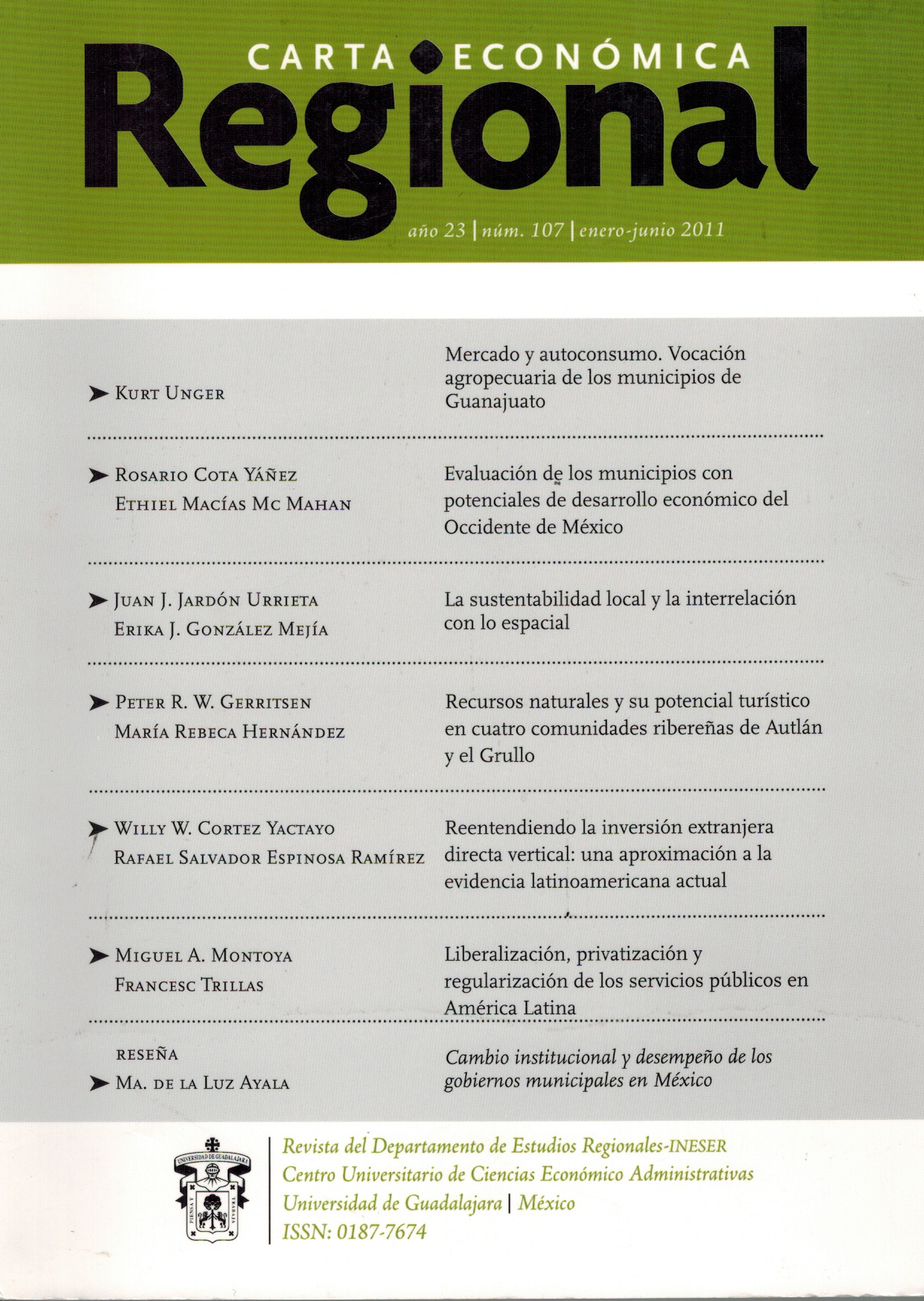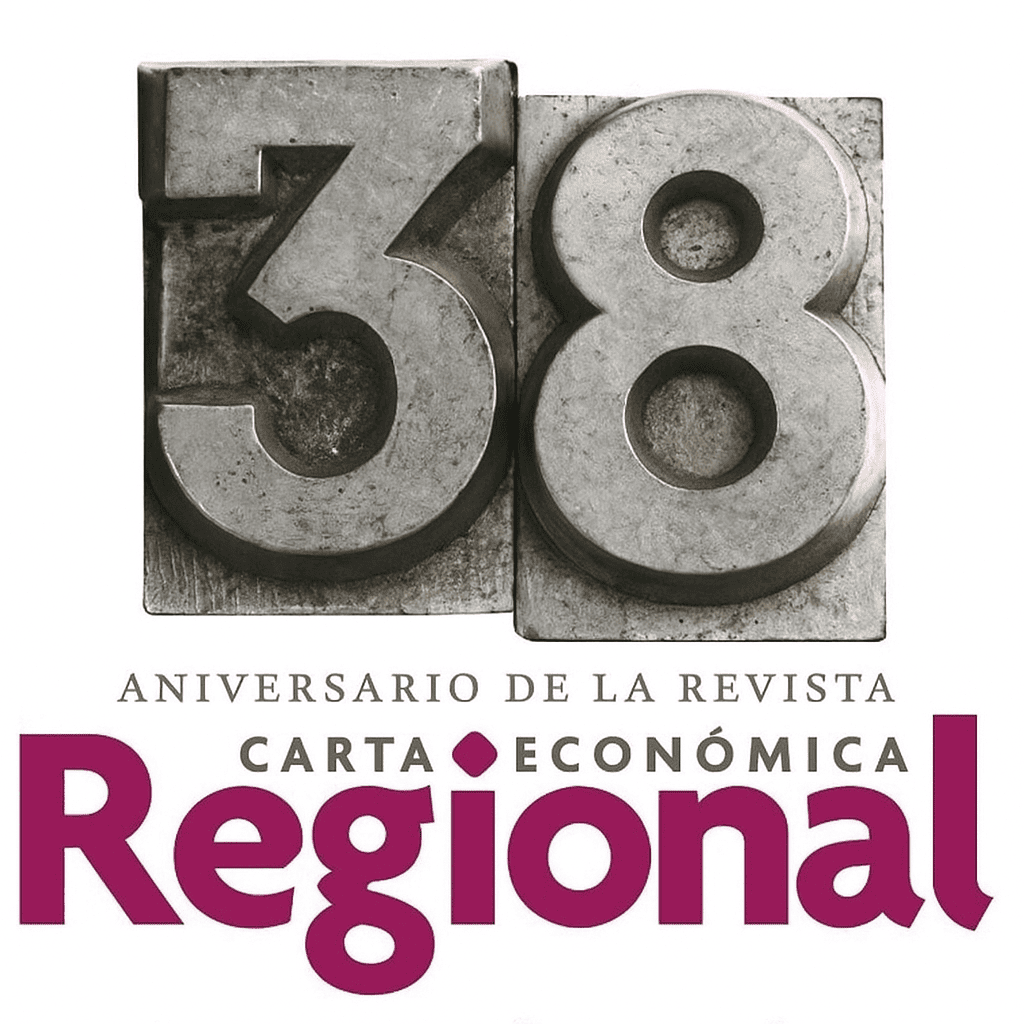LIBERALIZACIÓN PRIVATIZACIÓN Y REGULARIZACIÓN DE LOS SERVICIOS PÚBLICOS EN AMÉRICA LATINA
Resumen
SIN RESUMENCitas
Andrés, L., Guasch, J. L., Diop, M. & López, S. (2007). Assessing the Governance of Electricity Regulatory Agencies in the Latin Anterican and Caribbean region: A Benchmarking Analysis. (Mimeo).
Banco Mundial. (2008). World development indicators in CD-ROM. Washington, DC:Banco Mundial.
Banerjee, A. V. (2004). Inequality and hwestment. (Mimeo).
Banister, D. & Berechman, J. (2000). Transport Investment and Economic Development. UCL Press.
Basanes, F. & WVillig, R. (Eds.) (2001). Seconut-Cenention Reformis in Inprustricture
Services. The John Hopkins University Press.
Benitez, D, Chisari, O. & Estache, A. (2003). Can the Gains from Argentina's Utilities Reform Offset Credit Shocks? En Ugaz, C. & Waddams-Price C. (Eds.), Uhlity Privatization and Regulation. A Fair Deal for Consmurs? Edward Elgar.
Bouille, D. & Wamukonya, M. (2003). Power Sector Reform in Latin America: A Retrospective Analysis. En Wamukonya, M. (Ed.), Electricity Reforn: Social and Environmental Challenges. United Nations Environmental Programme.
Campos, J, Estache, A., Martin, N. & Trujilla, L. (2003). Macroeconomic Effects of Private Sector Participation in Infrastructure. En Easterly, W. & Servén L. (Eds.), The Limits of Stubilization. kuyfrastructure, Public Deficits and Growth in Latin America. Stanford: Stanford University Press/Banco Mundial.
Chisari, O, Estache, A. & Waddams-Price, C. (2003). Access by the Poor in Latin America's Utility Reform: Subsidies and Service Obligations. En Ugaz, C. & Waddams-Price, C. (Eds.), Utility Privatization and Regulation. A Fair Deal for Consumers? Edward Elgar.
Chong. A. & López de Silanes, F. (2005). The Truth about Privatization in Latin America. En Chong, A. & López de Silanes, F. (Eds.), Privatization in Latin America Stanford: Stanford University Press/Inter-American Development Bank.
De Ferranti, D, Perry, G, Ferreira, F. & Walton, M. (2003). Inajuality in Latin America and the Caribbean. Breaking with History? Banco Mundial.
Delfino,J. & Casarin, A. (2003). The Reform of the Utilities Sector in Argentina. En Ugaz, C. & Waddams-Price, C. (Eds.), Utility Privatization and Regulation, A Fair Daul for Consumers? Edward Elgar.
Easterly, W. & Servén, L. (2003). The Linits of Stabilization. Infrastructure, Pubke Deficits and Growtlh in Latin America. Stanford: Stanford University Press/Banco Mundial.
Engel, E, Fischer, R. & Galetovic, A. (2003). Privatizing Highways in Latin America: Fixing What Went Wrong. Economia: Journal of the Latin American and Caribbean Economic Association, 4(1), 129-158.
- (2007). The Basic Public Finance of Public-Private Partnerships. (Mimeo).
Estache, A, Foster, V. & Wodon, Q. (2002). Accounting for Poverty tu Infrastructure Reform. Learning from Latin America's Expericnce. World Bank Institute.
Estache, A, Perelman, S. & Trujillo, L. (2005). Infrastructure performance and reform in developing and transition economies: Evidence from a survey of productivity measures. World Bank Policy Researclh Working Paper, 3514.
Estache, A, Rossi, M. A. & Ruzzier, C. (2004). The Case for International Coordination of Electricity Regulation: Evidence from the Measurement of Efficiency in South America. Jourml of Regulatory Ecouomics, 25(3), 271-295.
Estache, A. & Wren-Lewis L. (2009). Toward a Theory of Regulation for Developing Countries: Following Jean Jacques Laffont's Lead. Journal of Economic Literature, Ammerican Econannic Association, 47(3), 729-770.
Gasmi, F, Noumba, P & Recuero, L. (2006). Political Accountability and Regulatory Performance in Infrastructure Industries: An Empirical Analysis. Work. Bauk Policy Research Working Paper, 4101.
Gómez Ibáñez, J. A. (2003). Regulating Infrastructure. Monopoly, Contracts and Diseretion. Harvard: Harvard University Press.
Gömez Lobo, A. (2007). Transantiago: Una reforma en panne. TIPS, 4. Chile: Universidad de Chile-Departamento de Economia.
Guasch, J. L. (2004). Granting and Renegotiating tnfrastructure Concessionus. Doing it Right, wai Development Studies. Washington, DC: Banco Mundial.
Guasch, J. L., Laffont, J. J & S. Straub (2002). Renegotiations of concession contracts in Latin America. Workl Bank Policy Rescarch Working Pıper, 3011.
Guerrero, I, López-Calva, F. & Walton, M. (2009). The Inequality Trap and Its Links to Low Growvth in Mexico. En Lery, S. & Walton, M., No Grawth withont Equity? Inequality, Iuterests, and Competition in Mexico. Banco Mundial/Palgrave Macmillan.
Gutiérrez, L. (2003). The Effect of Endogenous Regulation on Telecommunications Expansion and Efficiency in Latin America. Journal of Regudatory Economics, 23(3), 257-268.
Harris, C. (2003). Private Participation in Infrastructure in Developing Countries. Workd Bank Working Paper, S.
Holbum, G. & Spiller, P. (2002). Institutional or Structural: Lessons from International Electricity Sector Reforms. En Brousseau, E. & Glachant,I, The Ecomonrics of Contracts: Theories and Applications Cambridge: Cambridge University Press.
Jamasb, T. (2006). Between the State and Market: Electricity Sector Reform in Developing Countries. Utilities Policy, 14, 14-30,
Kessides, I. (2004). Reforming Iufrastructure. Privatization, Regulatiom and Conpetition. Banco Mundial/Oxford University Press.
Krueger, A. (Ed.) (2000). Economic Policy Reform: The Second Stage. Chicago: University of Chicago.
Laffont, J.J. (2000). bicentives and Political Econony. Oxford: Oxford University Press. (2005). Regulation and Devlopuent. Cambridge: Cambridge University -- Press.
Torero, M. & Pascó Font, A. (2003). The Social Impact of Privatization and the Regulation of Utilities in Peru. En Ugaz, C. & Waddams-Price, C. (Eds.), Utility Privatization and Regulation. A Fair Deal for Cousumers? Edward Elgar.
Trillas, F. (2001). The Takeover of Enersis: The Control of Privatized Utilities. Utililies Policy, 10, 25-45.
Ugaz, C. & Waddams Price, C. (Eds.) (2003). Utility Privatization and Regulation. A Fair Deal for Consmers? Edward Elgar.
Aquellos autores/as que tengan publicaciones con esta revista, aceptan los términos siguientes:
- Los autores/as conservarán sus derechos de autor y garantizarán a la revista el derecho de primera publicación de su obra, el cuál estará simultáneamente sujeto a la Licencia de reconocimiento de Creative Commons que permite a terceros compartir la obra siempre que se indique su autor y su primera publicación esta revista.
- Los autores/as podrán adoptar otros acuerdos de licencia no exclusiva de distribución de la versión de la obra publicada (p. ej.: depositarla en un archivo telemático institucional o publicarla en un volumen monográfico) siempre que se indique la publicación inicial en esta revista.
- Se permite y recomienda a los autores/as difundir su obra a través de Internet (p. ej.: en archivos telemáticos institucionales o en su página web) déspues de que su trabajo sea publicado, lo cual puede producir intercambios interesantes y aumentar las citas de la obra publicada. (Véase El efecto del acceso abierto).











